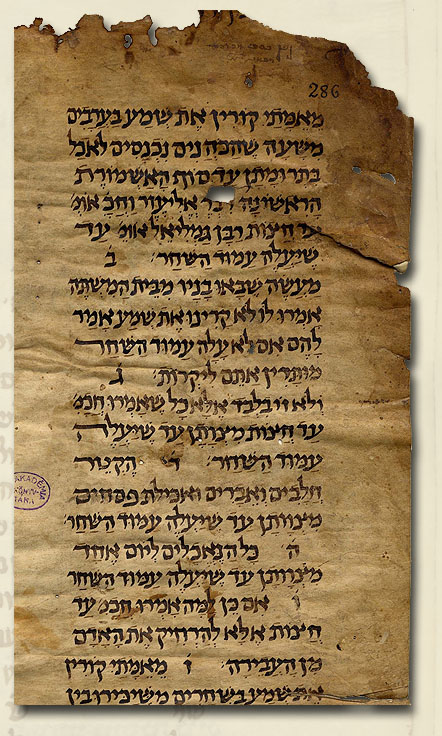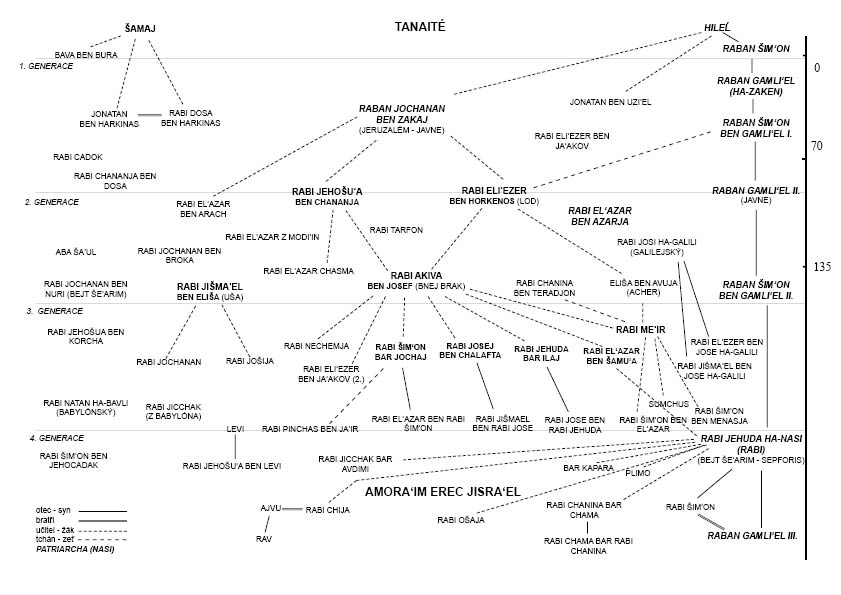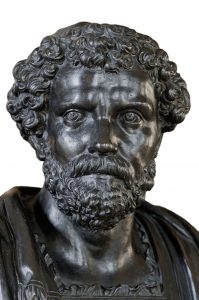
190 AD to 210 AD, Psalm 57: Mishnah.
This site was first built in French (see www.147thgeneration.net). The English translation was mainly done using « google translation ». We have tried to correct the result of this translation to avoid interpretation errors. However, it is likely that there are unsatisfactory translations, do not hesitate to communicate them to us for correction.
(for that click on this paragraph)
Summary
This generation is from the years 190 AD to 210 AD.
According to our count, this generation is the 57th generation associated with Psalm 57. It is in this Psalm 57 that we therefore find an illustration of the facts of this generation.
The hundred years after the reign of Hadrian represent from the point of view of relations between the Empire and Christianity on the one hand, the Judaism of the other, a calm period. On the Christian side, local persecutions but, apart from the case of Lyon in 177, no very significant events. On the Jewish side, the most complete calm succeeds the storm of 135. Under Antoninus, the two religions enjoy the same benevolence. Marcus Aurelius despises Christians, who die by pure obstinacy, playing tragedy, but neither the Jews nor the Christians were seriously worried during his reign and his actions. Commodus is for both religions a tolerant emperor. The Severans, African, very accessible to the religious influences of the East, they are the proven friends of the Jews, who have paid tribute to their kindness. Christians have no advantage in complaining about them.
Everything happens, as if the emperors deliberately held the balance between the two cults.
In this generation, Septimius Severus forbidding proselytism of the Jews, forbids the Christians at the same time, but without seeming to enforce this edict with more energy and obstinacy in one case than in the other.
For Christianity, it is the man who chooses or creates his God and not the opposite, he needs to reassure himself, to be sure of not being mistaken. For that, you have to convince the whole world, to be a missionary. This will be the case of Christianity, of course, but also of the other monotheistic religion: Islam.
Thus if the measures taken by Septimius Severus largely hinder the desire for expansion of nascent Christianity. It is probably by refusing to submit to this new deal that primitive Christianity undergoes almost a century of persecution.
However, these measures have little impact on Judaism.The Jewish religion, somewhere, is satisfied with this new status. Indeed, the Jewish religion is an election religion, the Jews were chosen by God, they do not need the world to be legitimized. The reaction to this is precisely for the Jewish people to create the conditions for survival through the centuries. This is what will be done during this generation on the finalization of the Mishna (the oral law).
Talk
Mishna
In this psalm it is necessary first of all to be interested in its title.

- For the conductor, al tashcheth, of David a michtam, when he fled from before Saul in the cave.
In the previous psalm, the title referred to the episode of I SAMUEL, when David fleeing Saul is in the hands of Akhich, king of Gath.
The present psalm, this time refers to the continuation of this episode, that is to say to the refuge of David in the cave.
In the previous generation, primitive Christianity, passing into the hands of the pagan-Christians, creates the materials that will nourish, for centuries and until modern times, the humanity of visceral and irrational anti-Semitism.
The reaction to this is precisely for the Jewish people to create the conditions for survival through the centuries. This is what will be done during this generation on the finalization of the Mishna (the oral law, definitively drafted in 218).

This first allows the writing of the Talmud (that of Jerusalem and then that of Babylon) and thus to lay the foundations of a particular spirituality allowing Jews for nearly twenty centuries to cross the vicissitudes of history while fully retaining their faith.
The Christian attacks aim to cut off the Jewish people from its roots and therefore from its covenant with God that is passed down from generation to generation.
This is vain, after nearly two thousand years of persecution, even if the Jewish people have suffered, he is still there, faithful to his covenant and with always the same hopes. Just as David emerged victoriously from the cave of Adulam, the Jewish people will come out of exile.
This promise contained indirectly in the title of the psalm is reaffirmed in the psalm itself.
Septimius Severus

This generation corresponds approximately to the reign of Septimius Severus (146-211, emperor from 193 to 211).
He succeeds to Commodus the last of the Antonines (after the brief passage of his two successors Publius Helvius Pertinax and Didius Julianus, no hereditary link, both murdered).
To look at this one, we must first recall the political context of this generation, dominated by the reign of Septimius Severus. This one, vis-à-vis the Jews, without really deciding with his predecessors, smoothly initiates a phase of withdrawal:
- The [1] hundred years after his reign (of Hadrian), that is to say the time of the last Antonines and Severos, represent from the point of view of relations between the Empire and Christianity on the one hand, the Judaism of the other, a calm period. On the Christian side, local persecutions but, apart from the case of Lyon in 177, no very significant events. On the Jewish side, the most complete calm succeeds the storm of 135. Under Antoninus, the two religions enjoy the same benevolence, Marcus Aurelius, emperor and Stoic, has little more sympathy for the one than for the other. He despises Christians, who die by pure obstinacy, playing tragedy. The Jewish turbulence reminds him, in worse, the Barbarians of the Danube. But neither were seriously worried during his reign and his actions. He represses the denunciation with still more rigor, if we believe Tertullian, than his predecessors. Commodus, indifferent to the affairs of the state and his duties as sovereign, is for both religions a tolerant emperor. The Severans, African, of Semitic affinities, still accentuated by the marriages, are less preoccupied than their predecessors of the strict Roman tradition. Very accessible to the religious influences of the East, they are the proven friends of the Jews, who have paid tribute to their kindness. « Judaecos plurinum dilexerunt, » says Septimius Severus and Caracalla St. Jerome, referring to the opinion of the rabbis themselves. Christians have no advantage in complaining about them: just as Caracalla has excellent relations with the Jewish patriarch, Julia Mammaea discusses theology with Origen. Everything happens, as if the emperors deliberately held the balance between the two cults. Septimius Severus, forbidding proselytism of the Jews, forbids the Christians at the same time, but without seeming to enforce this edict with more energy and obstinacy in one case than in the other.
Proselytizing
If the prohibition of proselytism is not strict, it lays the bridges of a new relationship of Rome with Judaism.
Religion was until then « lawful religion », this status had not really changed despite the war of 66 and the revolt of Bar Kokheba. Until then, when Rome had defined obstacles to the Jewish religion, it was never for a philosophical or religious purpose but always for political reasons.
This is no longer the case, and this is likely due to the appearance of the Christian religion, much more in search of power than Judaism and aimed at imposing a universalism in the Roman world.
The Jewish religion, somewhere, is satisfied with this new status. Indeed, the Jewish religion is an election religion, the Jews were chosen by God, they do not need the world to be legitimized.
Other monotheistic religions that emerge from Judaism will need to build their own pantheon, their own dogmas.
In this case, when it is the man who chooses or creates his God and not the opposite, he needs to reassure himself, to be sure of not being mistaken.
For that, you have to convince the whole world, to be a missionary. This will be the case of Christianity, of course, but also of the other monotheistic religion: Islam.
Thus if the measures taken by Septimius Severus have little impact on Judaism (apart from its withdrawal into itself), on the other hand, they largely hinder the desire for expansion of nascent Christianity.
It is probably by refusing to submit to this new deal that primitive Christianity undergoes almost a century of persecution:
- But [2] the equilibrium thus achieved for a century (until the reign of Septimius Severus) between the two religions, in favor of a general tolerance, was subsequently definitively broken in favor of Judaism. For Christians, the period of anarchy that begins with the death of Severus Alexander (222-235) and subsequent attempts at restoration marks the advent of a policy of active intolerance: the era of great persecution begins . Towards the Jews, on the contrary, imperial benevolence will not be denied. Even their propaganda, as we shall see, does not appear to have been seriously impeded during the third century. Thus, in the space of a hundred years, the reciprocal situation of the two religions before the imperial authority was totally reversed. The hopes which may have arisen in the beginning, among Christian apologists, of the difficulties of the Jews were disappointed. Under Hadrian, Judaism was the enemy, and the church might have thought for a moment that it would reap the benefit of this situation. From Decius, it is to Christians that the Empire declares war. In the meantime the Jews were quick to return to grace. This is done under the Antonines, while Christians are not yet explicitly banned from the Empire.
It is the whole of this new order that is born in the generation that interests us that David describes in his psalm:

- Be gracious to me, O God, be gracious to me, because my soul took refuge in You, and in the shadow of Your wings I will take refuge until the destruction passes.
- In the process of writing the Mishnah, the Jews, under the direction of Rabbi Yehuda Ha Nassi (135/220, Nassi from 170 onwards) will be locked in a spiritual envelope that will allow them to cross the centuries despite numerous attacks. of this material world.
- I will call upon the Most High God, upon the God Who completes [what He promised] for me.
- He will send from Heaven and save me from the disgrace of him who yearns to swallow me up forever; God will send His kindness and His truth.
- My soul is among lions; I lie among men who are aflame; their teeth are [like] spears and arrows, and their tongue is [like] a sharp sword.
- David recalls the strength that the Jewish people find in this spirituality that will allow them to face the most formidable enemies.
- Be exalted above the heavens, O God; over all the earth be Your glory.
- They prepared a net for my steps, he bent down my soul; they dug a pit before me, they will fall into it forever.
- Early Christianity disassociated itself from Judaism believing it to be moribund after the two wars against Rome (66 AD and Bar Kokheba). This is a miscalculation, because right now, Judaism shows its renewed vivacity as Christians prepare to face Rome in turn. This will be found throughout the centuries, for whatever the harshness of adversity, the Jews will always stand in front of the stage to show that God does not abandon them despite appearances.
- My heart is steadfast with God, my heart is steadfast; I will sing, yea, I will sing praises.
- Awaken, my honor; awaken [me], lyre and harp; I will awaken the dawn.
- I will thank You among the peoples, O Lord; I will sing Your praises among the kingdoms.
- For Your kindness is great up to the heavens, and Your truth is up to the skies.
- Be exalted above the heavens, O God, over all the earth be Your glory.
- It is in these conditions that David renews his faith in God. He knows that at the end of time (dawn), the election of the Jewish people will eventually be recognized by the nations who, joining the people of Israel, will give thanks to their creator.

[1] Marcel Simon / Vérus Israël / Chapter « Rome, Judaism and Christianity » (French: « Vérus Israël »/Chapitre « Rome, Judaïsme et Christianisme » (p. 129/130) ).
[2] Marcel Simon / Vérus Israël / Chapter « Rome, Judaism and Christianity » (French: « Vérus Israël »/Chapitre « Rome, Judaïsme et Christianisme » (p. 130) ).
